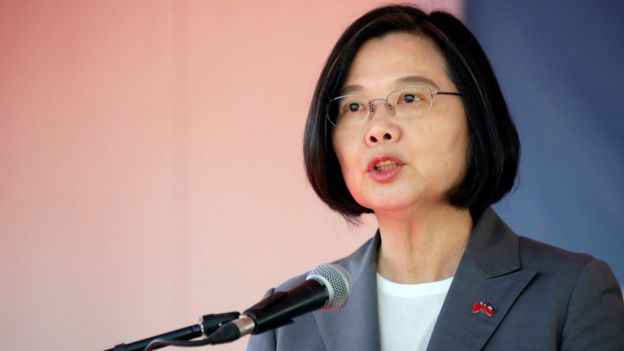
China has announced that it will stop issuing individual travel permits for Taiwan.
The country's tourism ministry said its decision, in effect from Thursday, was spurred by "the current cross-strait situation".
Solo travellers from 47 cities - including Beijing and Shanghai - have been able to visit since 2011.
But tensions have been rising with Beijing, which considers the island territory to be part of China.
The latest travel ban does not apply to groups of tourists.
However, visitor numbers could be cut by 700,000 if it remains in place until the end of the year, the South China Morning Post newspaper quoted Robert Kao, a member of Taiwan's Travel Agent Association, as saying.
Travel measures were relaxed under the former government of Ma Ying-jeou, whose Kuomintang party enjoyed warmer relations with mainland China.
Relations have since cooled and Beijing introduced restrictions on tour group numbers in 2016, the year Mr Ma was beaten by independence-leaning candidate Tsai Ing-wen.
But tourism numbers managed to remain constant, according to Taiwan's tourism bureau, with around 2.69 million people visiting from mainland China in 2017 and 2018.

Taiwanese President Tsai Ing-wen has been a vocal critic of Beijing
China has proposed that Taiwan be governed under a "one country, two systems" structure similar to Hong Kong.
President Tsai - who faces another election next January - has argued that civil unrest in Hong Kong shows this model to be a failure.
This week Taiwan held two days of live-fire military drills, coinciding with Chinese military exercises off the mainland coast facing the island.
China has never renounced using force to bring the island under its control, and warned last week that it was ready for war if Taiwan made any bid for independence.
Beijing has also criticised America for not adhering to its One China policy, under which the US recognises and only has formal ties with China, not Taiwan.
It has also accused the US of "undermining Chinese sovereignty" in its relations with Taiwan.
America has no official relationship with the island, but passed a law last year to encourage closer economic ties. It also allows US officials to meet their government counterparts in Taiwan, and vice versa.
Earlier this month the US also approved a potential arms sale to Taiwan, estimated to be worth $2.2bn (£1.81bn).